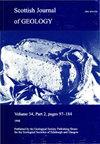巨型千足虫化石的交配轨迹
IF 0.5
4区 地球科学
Q4 GEOLOGY
引用次数: 5
摘要
来自苏格兰法夫下石炭世的三种密切相关的关节胸膜履带,cuithensis Diplichnites,表现出履带制造商之间相互作用的迹象。在两条轨道(A和C)的下坡侧,另一条轨道(B)的上坡侧,发现了一个额外的脚印文件。这些额外的脚印文件表明:每个轨道都是由两个不同大小的关节胸膜串联行走产生的,在一定距离内,它们的脚印正好在一侧匹配;或者一个关节胸膜部分安装在另一个的背部,产生三个平行的锉刀。这里有人认为后者是正确的,这代表了关节胸膜交配行为的证据。本文章由计算机程序翻译,如有差异,请以英文原文为准。
Mating trackways of a fossil giant millipede
Three closely associated arthropleurid trackways, Diplichnites cuithensis, from the Lower Carboniferous of Fife, Scotland, exhibit signs of interaction between track-makers. An extra file of footprints is found on the downslope side of two trackways (A and C), the upslope side of another (B). These additional files of footprints suggest that either: each trackway resulted from two arthropleurids of different sizes walking in tandem, matching their footprints exactly on one side for some distance; or that one arthropleurid was partially mounted on the back of another producing the three parallel files. It is here argued that the latter is correct and that this represents evidence of mating behaviour in arthropleurids.
求助全文
通过发布文献求助,成功后即可免费获取论文全文。
去求助
来源期刊

Scottish Journal of Geology
地学-地质学
CiteScore
1.70
自引率
0.00%
发文量
10
审稿时长
>12 weeks
期刊介绍:
Although published only since 1965, the Scottish Journal of Geology has a long pedigree. It is the joint publication of the Geological Society of Glasgow and the Edinburgh Geological Society, which prior to 1965 published separate Transactions: from 1860 in the case of Glasgow and 1863 for Edinburgh.
Traditionally, the Journal has acted as the focus for papers on all aspects of Scottish geology and its contiguous areas, including the surrounding seas. The publication policy has always been outward looking, with the Editors encouraging review papers and papers on broader aspects of the Earth sciences that cannot be discussed solely in terms of Scottish geology.
The diverse geology of Scotland continues to provide an important natural laboratory for the study of earth sciences; many seminal studies in geology have been carried out on Scottish rocks, and over the years the results of much of this work had been published in the Journal and its predecessors.
The Journal fully deserves its high reputation worldwide and intends to maintain its status in the front rank of publications in the Earth sciences.
 求助内容:
求助内容: 应助结果提醒方式:
应助结果提醒方式:


